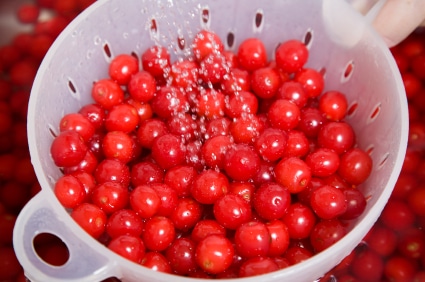
Tart Cherries
Drinking two ounces of tart cherry juice a day could offer protection against delayed-onset muscle soreness. When researchers at the London South Bank University in the U.K. gave athletes an ounce of tart cherry juice twice a day seven days before and two days after a challenging workout, their muscles recovered faster from the challenges of heavy exercise.
Tart cherries are a good source of anthocyanins, natural anti-inflammatory pigments that give them their cherry-red color. Tart cherries have some of the same benefits as non-steroidal anti-inflammatory medications – without the side-effects. Enjoy a glass of this lip-puckering juice before and after your workout, or take a tart cherry extract to get the anti-inflammatory benefits directly from nature – not a prescription bottle.
Salmon
Have a serving of salmon after your daily workout, and you may have less post-workout soreness. Salmon is a rich source of omega-3 fatty acids that have natural anti-inflammatory properties. According to a study published in the Clinical Journal of Sports Medicine, taking omega-3 fatty acids reduced markers for inflammation after a strenuous exercise session. And don’t forget their other health benefits. Omega-3 fatty acids are good for heart health and blood pressure too. Don’t like the taste of salmon? Take an omega-3 fatty acid supplement instead, but talk to your doctor first. People who are on blood thinners or who have a bleeding disorder shouldn’t take omega3s.
Chocolate Milk
Think chocolate milk is just for kids? Turns out it’s for serious athletes too. One study showed that soccer players who drank low-fat chocolate milk after a strenuous workout experienced more rapid muscle recovery than those who drank a commercial sports drink. Even though the players didn’t report differences in muscle soreness, they had lower levels of a marker for muscle damage.
The best way to enjoy a glass of chocolate milk after a workout is with a scoop of whey protein. Whey protein not only helps to build muscle, it too reduces markers for muscle damage. Try whipping up a post-workout chocolate shake with yogurt and whey protein for a muscle-soothing drink.
The Bottom Line?
Nature has her own ways to relieving muscle soreness. Reduce muscle soreness after a workout naturally by changing what you eat.
References:
Clinical Journal Sport medicine. 21: 131-137, 2011.
Eurekalert.org. “New Research Suggests Tart Cherries Could Speed Muscle Recovery”
American College of Sports Medicine. “Effects of Chocolate Milk Consumption on Markers of Muscle Recovery During Intensified Soccer Training”. 2009.
Related Articles:
Is It Delayed-Onset Muscle Soreness or an Injury?
How to Work Out When You’re Sore & Why You Should
Exercise Recovery: Can the Way You Recover from Exercise Impact Your Fitness Gains?
Ouch! Should You Work Out with Sore Muscles or Take a Rest Day?
Using Nutrition to Prevent and Relieve Post-Workout Soreness

